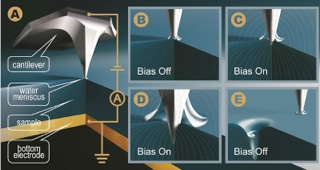Researchers at the Department of Energy’s (DOE) Oak Ridge National Laboratory (ORNL) have discovered a new method to control friction in ionic solids at the nanoscale using ambient water vapor and electrical stimulation.
Friction affects motion and hence frictional forces have to be controlled. Traditionally, lubrication or mechanistic means have been used for controlling friction forces.

This study was performed at the Center for Nanophase Materials Sciences (CNMS), which is a DOE Office of Science User Facility at ORNL.
The researchers used an atomic force microscope (AFM) to induce a strong electric field. This helped increase and decrease the friction between an ionic surface and a moving nanoscale electrode. They state that the moisture condensation from the surrounding air is responsible for the main effect and this leads to reduction of friction.
However, when the electric field is further strengthened, it makes the nanoscale electrode to penetrate the surface, which leads to increase in friction. The nanoscale penetration is an unexpected effect, and this is different from conventional friction control methods that often involve addition of a lubricant, though there are resources in the immediate environment that may be utilized.
Our finding can have a significant technological impact on applications for both macroscopic and nanoscale devices. Decreasing or increasing nanoscale friction at will and thus controlling mechanical energy losses and wear of a microelectromechanical system’s parts has enormous implications for applied energy research and opens a new vista for fundamental science studies.
Evgheni Strelcov - Lead Author
Center for Nanophase Materials Sciences
Other electrochemical friction control methods need an electrical current. However, energy losses occur when these methods are used. This novel method does away with the necessity of an electric current.
“Absence of current is highly beneficial from a power-saving perspective as it eliminates Joule heating and other parasitic power-consuming effects,” says Bobby Sumpter, who led the group developing associated theoretical models.
At CNMS, extensive research had been conducted on the electrical manipulation of various properties of materials that include ferroelectric, electrochemical and mechanical properties.
We adopted this biased view on the nanoscale almost a decade ago. Now we can proceed from observation to control of even such sublime phenomena as friction, and it is indeed very surprising and promising that we can both increase and decrease it.
Sergei Kalinin - Contributing Author
Rajeev Kumar and Bobby Sumpter of the CNMS and Computer Science and Mathematics Division; Sergei Kalinin, Alexander Tselev and Evgheni Strelcov of the CNMS; and Vera Bocharova of the Chemical Science Division are the authors of the study. This research has been published in the journal, Scientific Reports.
The Laboratory Directed Research and Development Program at DOE’s ORNL supported this study.